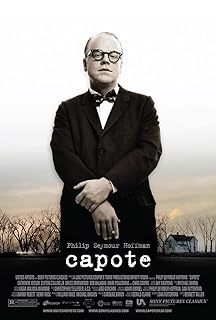電影訊息
電影評論更多影評

2005-11-22 00:47:02
have to see
Philip Seymour Hoffman's unmissable and unforgettable performance as Truman Capote should make him the front-runner for every Best Actor prize in the book. Great acting is quicksilver, impossible to pin down in words. But you know it when you see it. And you see it with dazzling clarity in this landmark portrayal. Hoffman gets the flamboyantly gay public image of the whiny-voiced gadfly who swanned through 紐約 literary circles. But his real triumph is inward, the way he finds the stillness in Capote and the emotions roiling in his eyes when what he sees in the world reduces him to awed silence. Nothing awed Capote more than the years (1959 to 1965) that he spent researching and writing In Cold Blood, his pioneering nonfiction novel about the murder of the Clutter family from Holcomb, 堪薩斯, and the two ex-convict drifters who killed them.
It's the riveting focus on that period that lifts Capote above the herd of biopics. First-time feature director Bennett Miller won praise for his 1998 documentary The Cruise, about a Manhattan tour guide, but nothing about that romp prepares you for the dramatic fireworks of Capote. Credit actor Dan Futterman, in a vividly impressive screenwriting debut, for carving an astutely narrowed script out of Gerald Clarke's 1988 Capote biography.
From the moment Capote arrives in 堪薩斯 to start his research with the help of his writer friend Harper Lee (a terrific, no-nonsense Catherine Keener) -- her first and only novel, To Kill a Mockingbird, depicts their 阿拉巴馬 childhood -- this haunted and haunting film holds you in its grip. The two writers charm Alvin Dewey (a superb Chris 古柏), the agent in charge of the case, and his wife (Amy Ryan) into giving them invaluable access. Capote finesses interviews with the killers, Dick Hickcock (Mark Pellegrino) and Perry 史密斯 (Clifton 科林斯 Jr.), establishing a rapport with the latter that borders on sexual fixation. The film leaves no doubt that Capote is exploiting these men for the sake of a book that he knows will make his career. But his kinship with Perry cuts to his own parental traumas. As Capote said, "It's as if Perry and I grew up in the same house, and he went out the back door while I went out the front." 科林斯 is mesmerizing, as Perry opens up to the writer whose languorous photo on the jacket of his first novel, Other Voices, Other Rooms, is called "undignified" by the convict.
Capote's manipulation doesn't come without a price. He relies on alcohol to dull the pain of offering comfort to the killers while wishing for their deaths by hanging so he can finish his book. Hoffman makes you believe Capote was sincere on both counts. He also makes you believe in his talent. Early on, we see Capote sneak into a 堪薩斯 funeral home and covertly open the caskets of the Clutter family. Later, at a 紐約 reading of the unfinished In Cold Blood, Capote recites the words that turn the reality of that immoral action into transcendent art. Capote is a movie that doesn't pull its punches. It's a knockout.
評論

